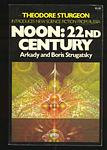Arkady Strugatsky
Arkady Strugatsky was a Soviet and Russian science fiction author who, along with his brother Boris Strugatsky, co-authored a number of highly acclaimed science fiction works. Their books are known for their complex characters, philosophical underpinnings, and social and political commentary. Some of their most famous works include 'Roadside Picnic', which was adapted into the film 'Stalker' by Andrei Tarkovsky, and the Noon Universe series. Arkady Strugatsky's contributions to the genre have made him one of the most important figures in Soviet-era science fiction literature.
Books
This list of books are ONLY the books that have been ranked on the lists that are aggregated on this site. This is not a comprehensive list of all books by this author.
-
1. Roadside Picnic
"Roadside Picnic" is a science fiction novel set in a post-apocalyptic world where mysterious extraterrestrial visitors have left behind dangerous and enigmatic zones known as "Visitation Zones." These zones are filled with hazardous artifacts that grant strange and unpredictable powers to those who come into contact with them. The story follows Redrick Schuhart, a "stalker" who ventures into the zones to retrieve valuable artifacts while navigating the treacherous landscapes and facing the moral dilemmas that arise from the desperate and corrupt society in which he lives.
-
2. Tale Of The Troika
This satirical science fiction novel delves into the absurdities of bureaucratic systems through the lens of a fantastical world. Set in a research institute that explores parallel universes, the story follows a group of scientists and bureaucrats as they navigate the complexities of an expedition to a mysterious Zone inhabited by mythical creatures and governed by illogical and arbitrary rules. The narrative humorously critiques the inefficiency, corruption, and power struggles inherent in bureaucratic institutions, using the fantastical elements of the story to highlight the absurdity of administrative red tape and the often Kafkaesque nature of governmental and organizational procedures.
-
3. Noon, 22nd Century
This book presents a collection of interconnected stories set in the 22nd century, a time when humanity has made significant advances in technology, society, and ethics. The narrative explores various facets of this utopian future, from space exploration and colonization of other planets to the profound changes in human relationships, work, and leisure. Through the eyes of its diverse characters, the book delves into the complexities and nuances of a world where humanity strives to balance technological progress with ecological sustainability and social harmony, offering a hopeful yet reflective vision of the future.


